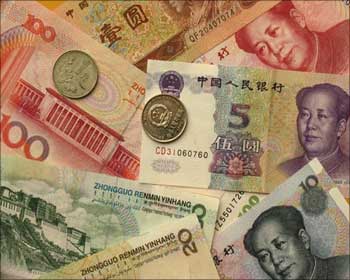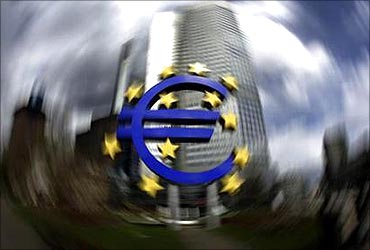 | « Back to article | Print this article |
'A double-dip recession not unlikely'
Renowned economist and Nobel laureate, Joseph Eugene Stiglitz does not rule out the possibility of a double-dip recession but feels it is more likely that growth will be slow, though not negative, in advanced economies facing an economic crisis.
In a wide-ranging interview with Business Standard, the professor with Columbia University says economic power is already shifting to emerging market economies.
He questions the competence of credit rating agencies, besides saying the US and Europe have forgotten the developmental agenda of the Doha Round of WTO negotiations. Edited interview:
Do you feel the euro zone crisis will have a domino effect? What is your expectation on a double-dip recession in countries facing financial problems?
It is clear that the issue of negative growth is not so interesting as compared to whether the growth will be large enough to reduce the very high level of unemployment in Europe and America.
It is clear that growth is going to be too slow.
Click NEXT to read further. . .
'A double-dip recession not unlikely'
Nothing in economics is certain but it is very likely that we will have growth so anaemic that there will be no significant dent in unemployment.
There is a chance that the growth will be negative, may be a double-dip.
It (euro zone crisis) will clearly have a negative effect.
But, I think it would slow growth but not destroy it.
So, I am optimistic. But, I am not optimistic about the US, in the sense that there is a euro crisis and American financial institutions are still very exposed.
What effect will it have on emerging market economies?
The emerging markets have succeeded, post-2008, in showing they can maintain growth even when the North Atlantic is doing very poorly.
Part of the reason is because they have a very large domestic economy and a rising middle class that can give rise to potential demand.
Click NEXT to read further. . .
'A double-dip recession not unlikely'
So, they are changing the structure of their economy.
Whether they have done it fast enough to withstand a shock is a question, because we have a globally integrated economy.
Do you see economic power shifting from the North Atlantic to emerging markets?
That is already happening.
This process is on and will continue.
The G-20 going from G-8 was a recognition that you cannot address the global problem without having India, China, Brazil at the table.
Second, with the euro crisis, the leaders are looking at emerging markets for money.
That is a total reversal of role and a recognition that Europe and America have troubles, are weak and would have a difficult time responding to another crisis on the basis of their own resources.
Click NEXT to read further. . .
'A double-dip recession not unlikely'
Moody's Investor Services has downgraded our largest bank, SBI, and Standard & Poor's had earlier scaled down the US sovereign credit rating.
Their role had drawn strong criticism earlier, at the time of the global financial crisis. What is your take on their actions?
The rating agencies have demonstrated their incompetence.
They did it before the East Asia crisis, where Thailand was rated well just a couple of days before the crisis.
They did it before the subprime crisis, when they were giving 'A' ratings.
Their downgrade of the US was absurd, a political act, not economics.
I do not know about India but one has to recognise that they are political institutions. They are profit maximising firms that can make money by giving ratings.
They gave good ratings even to the investment banks; I do not know what is their position now.
Click NEXT to read further. . .
'A double-dip recession not unlikely'
Various analysts criticise our federal government's fiscal management, saying it is working against the tight monetary moves of RBI. Do you agree?
The monetary-fiscal mix is a decision that every government has to make, so it affects the direction of the economy.
At some point, there could be need for more public investments such as in infrastructure and less need for private investment in speculative real estate.
If you are in that kind of a mix, you will have an expansionary fiscal policy to invest in roads, infrastructure, education and, at the same time, use monetary policy to try to restrain real estate.
So, it is more than just a question of tightening; it is the direction of the economy that is at stake.
Click NEXT to read further. . .
'A double-dip recession not unlikely'
Where do you think the Doha Round of global trade talks under the World Trade Organization is headed? Do you think the relevance of WTO diminishes with this or it remains?
I think the WTO plays a very important role. It prevented countries from taking protectionist action during the crisis.
The Doha Round began a decade ago and it began as a development round but Europe and America forgot that. It is no more a development round today.
It began by saying it would address the imbalances of the Uruguay Round.
But, now the US and Europe are saying, you give me something and then I will give you something.
Click NEXT to read further. . .
'A double-dip recession not unlikely'
They forgot about the imbalances that motivated the Doha Round.
The current round is not a development round.
The analysis I have seen is that there are actually benefits for most developing countries, whereas some of the poorest countries in Africa are going to be worse off.
So, my own view is that it would be probably better to take a rest and then start another development round in the true sense.
The fallout of a deadlocked Doha has given rise to individual bilateral arrangements. Are you supportive of this second route of trade liberalisation?
This is worse.
That I think is very dangerous.
First, it is undermining the multilateral framework.
Second, the balance of power is much worse. Some of the bilaterals had been disadvantageous for developing countries.







